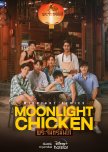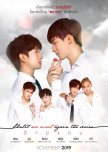Strongest LGBTQ Vibes in BL Series
BL series need not depict queerness accurately. Or at all. Showcase a fluffy, happy same-sex couple, and a BL has done its job. Sometimes, BL characters deny being gay. This tendency toward “I just like you” stories can fetishize gay lives for entertainment and ignores difficult realities of gay experience. An actual queer person can likely detail a personal, internal journey to understand and accept a sexual attraction to same-sex partners. Queer folks routinely face complications their straight counterparts just don't face.* In BLs, this seldom gets beyond homophobic parents who meddle in the plot—er, the offspring’s lives—because they what's best for their offspring. Unlike BLs, LGBTQ films routinely tread in such themes. If depicting a queer "experience" is a characteristic of LGBTQ genre works, then centering the plot around a fluffy boy-on-boy romance, however implausible, is the chief attribute and raison d'etre for BL genre works.
*Hence the term “straight privilege.”
That's not a complaint! We BL fans want our romances light and fluffy! We binge series after series to get our fluffy fix! Indeed, every title on my list features at least one couple whose pairing fans can swoon over. But occasionally a BL series pauses the fluffiness long enough to recognize that being gay, in real life, entails more than just one guy confessing his love to another guy. Were we to depict the universe of BL and LGBTQ dramas in a Venn diagram, they'd be separate categories with an area of overlap. All the series listed below would occupy that shared zone, manifesting traits associated with either genre. Here are a few series that do this really well. Notably, most of these series are more recent, which reflects not only an influx of queer writers and directors, but also perhaps that the audience is ready for more well-rounded storytelling.
-
1. Love in the Big City
Korean Drama - 2024, 8 episodes
-
2. Moonlight Chicken
Thai Drama - 2023, 8 episodes
Too often BL series believe having two men hop into a bathtub together qualifies as depicting gayness. Many never reach that level of intimacy, providing instead a last minute kis—high-five. In reality, living a gay life may include such intimacy, but the bedroom has little to do with the day-to-day reality of queer existence. Moonlight Chicken understands the difference between gay-as-entertainment and commentary about gayness. The series is built around four gay men in their 20s. None of the four questions his sexuality, which was settled before the events of the series commence. Two of them are trying to disentangle from a failed long-term relationship. Two of the four agree to a night of no-strings attached sex. One of the four has soured on trying romance a second time. One of the four feels lonely and isolated and desperately wants to find someone. All of them have lived their lives as gay men. Being gay does not fully define any of them, but that reality does shape the options available to them. These characterizations endow Moonlight Chicken with as authentic a sensibility about gay life as any BL series from Thailand has ever had. That screenwriter and director Aof created relatable characters with smart dialog elevates the series into rarified air. For those who prefer their BLs more on the BL side, a pair of high school students provide a side couple whose storyline resembles traditional BL storytelling. In the later episodes, the series even gets a little preachy in its advocacy for accepting same-sex attraction as a perfectly ordinary type of human possibility. Nevertheless, by reminding us that universal adult challenges like parenting, losing a parent, paying rent, and healing from loss play out differently for gay men than they do for others, the series managed to both universalize the gay experience while simultaneously chronicling it.
-
3. The Miracle of Teddy Bear
Thai Drama - 2022, 16 episodes
(2022) Advertised as a cute BL about a stuffed animal come to life as a human, The Miracle of Teddy Bear channels western coming out tales that have a deserved reputation for dark, emotionally charged storylines. The lead character is Nut, an aspiring screenwriter suffering from PTSD incurred at the hands of a father who abused his mother and his son because he loathed his son's "girly" interests. Dear Old Dad squashed his son's incipient first love a decade earlier when Nut was still in high school. Commissioned to author a BL screenplay, Nut channels his own life history into the project, creating a BL within the BL.
The unreliable nature of memory infuses MOTB. The screenplay compels Nut to confront his darker memories of childhood, but the story also affects Tofu, Nut's oversized teddy bear transformed into a human in episode 1. Tofu (the bear) had been gifted to Nut by Tarn, his aborted First Love. That connection compels Tofu (the human) to investigate every detail about Nut's high school past and Tarn’s tragic present. Loss of memory influences other aspects of the tale. Nut and his mother pass of Tofu to neighbors as an amnesiac they have taken in. Her own PTSD led Nut's mother to construct an alternate reality regarding her late husband's demise, and in later episodes, she receives a diagnosis for Alzeheimer's. An aunt and uncle also shed light on the family's past, but their self-serving narratives later turn out to be riddled with errors. Meanwhile, a detective tries to determine what happened to Tarn, another example of reconstructing the past.
-
4. Like in the Movies
Filipino Drama - 2020, 8 episodes
(2020) This Filipino drama, also called Gaya sa Pelikula, features a central couple who each seems to understand himself as a gay man, but they are at different stages of readiness to live that truth openly. And that real-life scenario complicates their romance. It also features a gay uncle who empathizes with his nephew's hesitance to come out fully while also envying that the nephew's generation has an easier road to tolerance--one he wishes his generation had had. GSP also features a sibling who once allied herself with a homophobic parent but now declares herself a gay ally. These introspective moments just scream LGBTQ storytelling! Yet, GSP also has that most ridiculous of BL tropes--the fake relationship. Not to mention a first kiss that wins my award for Best First Kiss We Totally Knew Was Coming But Were Still Caught Off-Guard By Anyway. And for those readers who question why this list needs to exist--seek out on YouTube the reaction video to Episode 6 posted by the BL Bros. (The BL Bros React & Unpack/Gaya sa Pelikula Ep 6). Three intelligent men reduced to tears because they are so startled to encounter a domestic (Filipino) story that actually reflects their own experience as gay men. That, folks, is why I made this list. Representation matters.
-
5. My Ride
Thai Drama - 2022, 10 episodes
(2022) Whether one looks at My Ride for its by-the-numbers BL plot or for its unusually frank examination of family in gay relationships, the series is underappreciated. Telling the story of Tawan, an overworked doctor who develops an interest in a motorcycle taxi driver, Mork, My Ride toys with the notion of family on several levels. First, the series introduces one of the more compelling side couples ever: a longterm, older gay couple whose verbal sparring infuses both levity and affection into the unfolding tale. Literal uncles to Mork, the duo's life experience becomes an invaluable resource to their nephew. Their advice ranges from coming out as gay to reationship building. Miracle of Teddy Bear featured a similar couple, but the pair here proves more prominent and memorable. Second, Mork assumed parenting responsibilities for his nephew, a late plot reveal that surprised viewers and Tawan alike. To date Mork necessarily meant embracing his parental responsibilities. The idea of "chosen family" has long played a role in the construction of queer community networks, My Ride gives that idea a most literal expression. With the uncles as living proof that choosing your family provides a lifelong option, Tawand Mork eye their future together as more than simply consummation of mutual desire: they commit to the idea of family.
-
6. His - Koisuru Tsumori Nante Nakatta
Japanese Drama - 2019, 5 episodes
(2019) For the first two of the series' five episodes, viewers could easily conclude they're being treated to a standard BL series about high school boys who meet and fall for one another. Shun has traveled to a seaside town for spring break when he meets Nagisa, a boy his own age who lives independently from his family. While sharp-eyed BL fans will notice the immediate spark between the lads, it takes the two of them a bit longer to process their feelings. Coming out is a process, and exploring the ramifications of experiencing that process has for decades been a staple of the LGBT genre, especially the subdivision on coming out. Over the final two episodes, the series is clearly interested in showing how the two boys experience the process. That Nagisa's starting point begins the story farther down that path is directly relevant to inspiring Shun to recognize and accept his own latent ideas about sexuality. The series provides one of the more tender, introspective examinations of coming out to unfold in any ostensibly BL series.
But wait! There's more! The TV series was set around 2010, and a film sequel picks up the story of Shun and Nagisa a decade later. Sporting a truncated version of the title, His (2020) picks up their story several years after they graduated from university. (Age appropriate actors portray the characters in each project.) The film sequel is an absolute must-watch, better than the series. Strictly speaking, the film has little BL DNA and squarely belongs in the LGBT genre category.
-
7. I Told Sunset about You
Thai Drama - 2020, 5 episodes
Powered by strong characters, a coming-of-age story that resonated, and powerhouse acting from PP Krit and Bilkin, ITSAY became a fan-favorite at the end of the Pandemic Year. The story centers on two high school seniors who once were friends but drifted away from another in early adolescence. Their former affinity ignites into a mutual attraction when they cross paths at a Chinese language cram school. Teh (Bilkin) and Oh-Aew (PP Krit) nurse lingering resentment and mistrust from their earlier falling out, but those negative feelings crumble in the face of newer emotions. The boys’ struggles to figure out how to process these new emotions fuels both the series’ drama and also its emotional beats.
In many ways, ITSAY is a coming out story. Unlike most western coming out stories, coming to terms with a sexual identity—one that defines the person in a social sphere—is not at issue here. Instead, the emotional resonance arises from the boys’ struggles to accept they feel a same-sex attraction. Like Gaya sa Pelikula, the two characters occupy different points along the process of self-acceptance. Oh-Aew seems already to have recognized that he likes men, including Teh. For The, however, his very self-image must be revised. The late drama arises because Teh cannot envision a world in which the two of them can become a couple. This coming-out-to-self aspect of ITSAY, especially for Teh, makes this Thai series a landmark example of coming out stories from any country.
Ultimately, ITSAY succeeds because the emotional beats of its adolescent characters feel authentic. The cinematography is lush; the setting, away from Bangkok, made for a refreshing change; and the acting stands out. But these factors are secondary to the emotional arc established by the series. The story of Teh and Oh-Aew was always planned as two-series of five episodes each. Its sequel, I Promised You the Moon (2021), carves out its own unique niche in this category.
-
8. Lovely Writer
Thai Drama - 2021, 12 episodes
(2021) This Thai drama will be most famous for revealing "how the sausage gets made" details about the BL industry itself. Aside from its tendency to dish dirt, the series also offers one of the most nuanced presentations of a main character struggling with his sexual identity. While the series never quite made Gene's thought processes clear about going into the closet, Nubsib's aggressive courtship of him in the early epiosodes clearly compelled a moment of reckoning in the second half of the series. Any person who has themself grappled with coming out--how? when? to whom?--will empathize with Gene's journey. The series also has one of the most compelling coming-out-to-family scenes I've ever seen, one that includes both sets of parents and two brothers while gathered around a picnic table. (That scene even includes a discussion that acknowledges how the surging popularity of BL series normalizes wider acceptance of choosing to embrace queerness.) In the aftermath of that revelation, Gene even utters the words, "I am gay!" He thereby claims explicitly an identity few BLs bother to acknowledge that directly.
-
9. HIStory3: Make Our Days Count
Taiwanese Special - 2019, 20 episodes
(2019) Frankly, I could have chosen any title from the first three iterations of the HIStory series because nearly every entry in this Taiwanese collection of dramas features at least one character trying to figure out how to incorporate his sexual attractions into his life. (Note: This database lists 10 entries in the series as of this writing, and each story stands alone. Watch in any order.) Though I regard HIStory3: Trapped as the most entertaining entry in the series, for this list I commend Make Our Days Count because rather than denying he's gay when he recognizes his attraction to a classmate, the main character actually grapples with what that attraction means to his sense of self--and he doesn't find a pat answer in just a single episode. Moreover, one of his friends is clearly leading a secret double life--and that's an achingly real plotline to any queer person who's had to live in a society where being openly gay isn't easy to do. That he crushes an on older--and very out!--gay acquaintance is also more LGBTQ plot than BL plot.
-
10. I Promised You the Moon
Thai Drama - 2021, 5 episodes
This sequel to ITSAY substantially alters the original’s successful formula. Plumbing deeper depths of emotion, I Promised You the Moon is darker in tone, less hopeful. Where ITSAY relates a straight-forward tale of adolescent courtship, IPYTM depicts the complexities of sustaining an established relationship against the pressures of adult life. Being young—and therefore, stupid—our heroes experience an ugly break-up.
This focus on managing adult relationships distinguishes IPYTM from standard BL fare. Innumerable BLs lose interest in the characters once courtship morphs into commitment. This series examines the rigors of staying committed. Each of the series’ five episodes focuses on a different year of the university experience. The time jumps disrupt the story rhythm, and make the deterioration of Teh’s and Oe-Aew’s commitment to one another feel rushed. In the opener, the duo leave Phuket for university life. Having matriculated at different institutions becomes the first challenge. Spending time together requires a long commute, and each develops a new friend group into which the other does not quite feel included. The bond born of a shared major weakens once Oh-Aew realizes his academic interests have shifted. Life dropped different variables into the boys’ experience, and they prove unable to incorporate those variables into their personal dynamic. Episodes 2 and 3 are particularly poignant, the impending disaster apparent to the viewer long before Teh or Oh-Aew assimilate the danger signs. The finale, a study in forgiveness and second chances, offers the characters’ a fine benediction.
Ultimately, IPYTM is a study in why relationships fail. None of the circumstances leading to their break-up or to their reunion are unique to same-sex couples. Like To My Star 2, another BL sequel that defies easy categorization as either BL or LGBT fare, IPYTM treads in universal themes.
-
11. Life: Senjou no Bokura
Japanese Drama - 2020, 4 episodes
(2020) This lovely, high-concept story out of Japan, also called Life Love on the Line, tracks the lives of the two main characters from high school into early adulthood. It makes the list because their relationship founders in the face of pressure from family and society--a concession by one party to the need to live life deemed "respectable" by society. One of the tenets of the gay pride era, however, is that it's harmful to the individual to deny his true nature....Life Love on the Line gets that in the end.
-
12. Kare no Iru Seikatsu
Japanese Drama - 2024, 8 episodes
In 1976, author Andrew Tobias published a memoir-novel entitled The Best Little Boy in the World. As protagonist, the novel featured an adolescent who always strove to present a perfect version of himself. Primarily, to deflect attention away from the fact he harbored a secret about his sexual inclinations. The novel has remained in print since, largely because so many gay men and lesbians see some version of their own adolescence portrayed within its pages. The "best little boy" trope is so compelling, psychologists have found it operating across diverse populations.
This ordinary-seeming J-BL plays with this ubiquitous trope from a fresh angle: the primary point-of-view character is not Kazuhito, the BBLB himself, but his college roommate, Ryota. The latter makes it his mission to discover why Kazuhito cannot maintain romantic relationships for very long. Kazuhito is certainly guarding a secret, and Ryota gradually comes to realize that secret involves him. By that time, the series has more in common with the typical BL formulas, but the perfect boy trope absolutely resonates with broader queer literature.
Citation: https://onlinelibrary.wiley.com/doi/full/10.1002/ejsp.2800
-
13. Gameboys
Filipino Drama - 2020, 13 episodes
(2020) Gameboys is one of a handful of series from the pandemic year that more or less launched BL as a viable commercial genre in the Philippines. It drew acclaim for figuring out how to produce a drama in the midst of a pandemic that made traditional filmmaking impossible. That aside, it also discusses issues surrounding coming out--and who should get determine the timing of when to come out. That is hallowed territory for gay folks.
-
14. 180 Degree Longitude Passes Through Us
Thai Drama - 2022, 8 episodes
With few set changes, few characters, and a compressed timeline, this intriguing short-form series shares many qualities with a stage play. It features two characters trying to define their sexuality, each at a widely disparate moment in life. In is a middle-aged architect who lives a solitary life in a sprawling rural mansion. An apparently accidental encounter with an old college friend and her teen-age son, Wang, disrupts his solitude. In invites the du to spend the weekend at his place, unaware that Wang has an agenda. He knows that In and his late father were close friends, and Wang seeks to learn more about his father through the eyes of his parents’ friend. Almost immediately, Wang begins to feel an attraction to the older man, and to his discomfort, In realizes the attraction is mutual. The beats of this story have little in common with BL storytelling, but will resonate with anyone accustomed to the moodier vibe common on the LGBT side. In addition to a compelling character study of two very different gay men, 180 Degrees excels in most technical areas: set design, directing and editing, and a thoughtful script.
-
15. More than Words
Japanese Drama - 2022, 10 episodes
This excellent short series has few BL trappings. Its claim to that genre rests on a main character who begins the series as a high school student. He quickly develops an attraction to a co-worker several years his senior. The interest is reciprocated, and the two have a semi-clandestine afair for several years. When the older man's parents pressure him to find a wife, his boyfriend's female best friend agrees to act as his wife for the sake of appearances. The three pursue a complicated dynamic until a pregnancy eventually drives away the main character. The last two episodes deal with the aftermath of that betrayal, as the jilted lover attempts to rebuild his life with a new man. It's never quite clear which of those two is using the other only for sex, but the messy storyline contributes to the emotional angst. More Than Words is first and foremost a character study, uninterested in adhering to tropes of either the BL or LGBT genre. I include it here, however, because youthful explorations of sexuality and the consequences of homophobia both qualify as themes that exude LGBT vibes.
-
16. Cherry Magic! Thirty Years of Virginity Can Make You a Wizard?!: The Movie
Japanese Movie - 2022
BONUS TITLE: Despite being entertaining in its own right, the film sequel to the beloved 2020 BL series failed to inspire the affection the progenitor series did. Because films have always had an easier time raising LGBT storylines, I intended to limit this list to series only. But I include this film because it strays away from its BL origins to incorporate elements associated with LGBT storytelling.
Whereas the original series is purely BL, the film touches on themes familiar to followers of LGBT genre material. The series never delves into the characters' sexual identities. It never explores whether their relationship will have professional, social, or familial consequences as they begin to read as "gay couple" to others in their lives. By contrast, the movie takes on these challenges. The origins of gay marriage as a civil rights issue in the 1990s is a direct consequence of the AIDS crisis. The connection was the experience of hospitals and families marginalizing the sick person's gay lover. By showing how invisible Kurosawa became when Adachi suffered a medical emergency, the movie echoes that historical reality. The incident galvanizes them into coming out to friends and to family. Ultimately, the film concludes with a gay wedding. That that marriage has no legal standing in Japan goes unremarked, but the filmmakers make their point just by reminding viewers that formalized commitment rituals matter in real life. On the whole, Cherry Magic: the Movie delivers a subtle, but powerful endorsement in favor of coming out and for gay civil rights.
-
17. Kimi to Nara Koi wo Shite Mite mo
Japanese Drama - 2023, 5 episodes
Comments will be added soon. 6 Nov 2023
-
18. Watashi to Otto to Otto no Kareshi
Japanese Drama - 2023, 10 episodes
This complex story of a wife who learns her husband has fallen for another man blurs many boundaries. The Japanese title translates as "Me, My Husband, and My Husband's Boyfriend," and the title delivers exactly as advertised: three people caught up in an interlocking relationship. Only Japanese society has not offered them the conceptual vocabulary to explore this situation. "The worst thing is that this world doesn't let people face their true selves," observes the Boyfriend in the fifth episode.
[In progress. More to follow. --17 June 2024]
-
19. Smells Like Green Spirit
Japanese Drama - 2024, 8 episodes




































